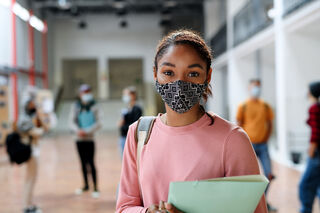Anxiety
Back-to-School Angst in the Age of COVID
Understanding your tween’s reticence to return to the academic environment.
Posted September 3, 2021 Reviewed by Davia Sills
Key points
- Back-to-school anxiety is complicated by COVID.
- There are simple steps you can take to support your tween.
- Don't overlook other common back-to-school anxieties your tween may experience in addition to COVID-related concerns.
- Work with your tween to develop coping skills to manage back-to-school anxiety.

This was supposed to be the summer we bid farewell to COVID-19. This meant back to school was surely supposed to be business as usual. As the Delta variant continues to cause a surge in cases, however, school-aged children everywhere are faced with a multitude of uncertainties ranging from questions about vaccine and mask mandates to concerns about a return to online school. On any given day, ask any tween, parent, or teaching professional about these sensitive subjects, and you are sure to get a different opinion from each.
And while it is true that most children tend to be resilient in general, the added uncertainties attached to this year’s back-to-school season should not be ignored.
What follows are some quick tips to acknowledge and quell your tween’s back to school anxiety:
If you don’t ask, they may not tell—well, at least not verbally.
It is important to check in directly with how your tween is feeling. The best approach is to avoid asking yes or no questions. Instead, try asking assuming questions: for example, “It must be harder to return to school this year because we are still dealing with COVID-related rules.”
Regardless of your child’s response, use his answer as the springboard to an interactive conversation. If he seems particularly annoyed or irritable leading up to and after back to school, he may be experiencing anxiety. If he seems frustrated, or your loud child goes quiet, he may be nonverbally expressing his inner angst. No need to guess; simply talk with him.
Don’t assume you know specifically what your child is concerned about.
A stated above, the way to get her talking is by validating that the anxiety exists by asking an assuming question. Once you get her going, however, you may be surprised by her specific concerns. Above all, don’t assume that your concerns are her concerns.
For example, I have spoken with many kids who don’t care if they have to wear masks as long as they get to attend school. Meanwhile, their well-intentioned parents are arguing with school administrators that their kids can’t learn if they have to wear a mask. Some kids thrived during virtual school, while others tanked, so one situation or another will impact them differently. Some kids are totally fine with going back to school with or without masks, while others are terrified they will get sick under any circumstance.
COVID compounds the other typical back-to-school anxieties, which should not be overlooked either.
As a parent, you may have COVID-specific concerns, such as whether or not your child’s school will require a mask mandate. And while this may be a major concern of yours, your child may be focused on other things more typical of back to school, such as getting to classes on time, especially if they are starting a new school, locker anxiety (aka finding their locker and then being able to open it), social anxiety, etc. The best way to offer support is to engage in interactive discussions with them. Focus on both the things they are looking forward to as well as any concerns or stressors they may be experiencing.
Anxiety begets anxiety, and they look to you to guide them.
If you are anxious about their return to school, they are likely to sense it. This, in turn, can signal to them that they are supposed to be anxious because they look to you to model behavior. With this in mind, check your own anxiety at the door. Be sure you have your own supports. Be calm and carry on, and when you feel like you can’t, fake it.
Come up with coping strategies.
Work with them to develop helpful ways to cope with the anxiety they may be experiencing. If they are feeling really overwhelmed, seek the help of a professional. Some helpful coping skills may include specific strategies to address a particular concern: For example, if they are concerned about navigating a new school, see if you can get in with them a few days before the first day of school and do a walk-through. More general coping skills could include having stress relievers on hand, such as stress balls or fidget toys. Pictures of favorite people or pets are another good way to quell internal chaos to calm.
Although COVID continues to loom larger than we would all like, as another school year begins, there is much to look forward to. By acknowledging the anxiety your tweens may be experiencing, you can work together with them to provide guidance and support.


